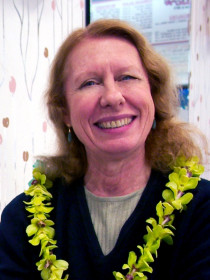
Meda Chesney-Lind
Professor of Women's Studies and Chair of the Women's Studies Department, University of Hawaii at Manoa
Chapter Member: Hawaii SSN
Areas of Expertise:
Connect with Meda
About Meda
Chesney-Lind is a feminist criminologist with an interest in gender and crime. She is also Past-President of the American Society of Criminology.
Contributions
In the News
Quoted by Wayne Yoshioka in "Legislation Needed to Help Sex Workers and Runaway Teens," Hawai'i Public Radio, January 17, 2018.
Opinion: "Girls Need Safety, Opportunity, Not More Policing," Meda Chesney-Lind, Juvenile Justice Information Exchange, November 15, 2017.
Quoted by Danielle Woo in "Catcalling is Not a Compliment: Why Men Catcall Brings Up Bigger Issues than Just Sexuality," Ka Leo , July 1, 2015.
Quoted by Ely Madden in "Policy Allows Student Charged with Sexual Assault to Remain in Dorms," Ka Leo, November 3, 2014.
Opinion: "We Need Police Accountability in Honolulu," Meda Chesney-Lind (with ), Civil Beat, October 6, 2014.
Quoted by Leila Fujimori in "Police Shootings Prompt Questions," Honolulu Star Advertiser, September 14, 2014.
Opinion: "Some Rescue: The FBI's Dubious War on Street Girls," Meda Chesney-Lind, Feministing, August 26, 2013.
Opinion: "Honolulu Prosecutor’s Allegiance to the Status Quo Runs against the Evidence," Meda Chesney-Lind (with ), Honolulu Star Advertiser, March 9, 2011.
Opinion: "Gender Matters in Juvenile Justice," Meda Chesney-Lind (with ), New York Law Journal, December 7, 2010.
Publications
"Violence against Women on Public Transport in Nepal: Sexual Harassment and the Spatial Expression of Male Privilege" (with ). International Journal of Comparative and Applied Criminal Justice (2013).
Shows how, as women move from lives confined to the domestic sphere, their very spatial mobility might be perceived to be a form of defiance and deviance. Finds that public transport offers males both proximity and anonymity, which, in turn, results in high levels of abuse with very little risk of social or legal consequences.
Feminist Theories of Crime (edited with ) (Ashgate Publishing Limited, 2011).
Re-imagines the field of criminology with insights gleaned from feminist theory and exemplifies the feminist concern for thinking consciously about how and why research should be constructed with the crucial goal of producing knowledge that will promote social justice.
Fighting for Girls (edited with ) (SUNY Press, 2010).
Uses the best data available about actual trends in girls’ uses of violence to find that by virtually any measure, incidents of girls’ violence are going down, not up. Additionally, rather than attributing girls’ violence to personality or to girls becoming “more like boys,” the contributors examine the contexts that produce violence in girls, demonstrating how addressing the unique problems that confront girls in dating relationships, families, school hallways and classrooms, and in distressed urban neighborhoods can help reduce girls’ use of violence.
"Beyond Bad Girls: Gender, Violence and Hype" (with ) (Routledge, 2008).
Challenges the characterization of the new "bad girl," arguing that it is only a new attempt to punish girls who are not the stereotypical depiction of "good."
Invisible Punishment: the Collateral Consequences of Mass Imprisonment (edited with ) (The New Press, 2002).
Examines the hidden ramifications of conviction for inmates, ex-felons, their families and the communities they come from.